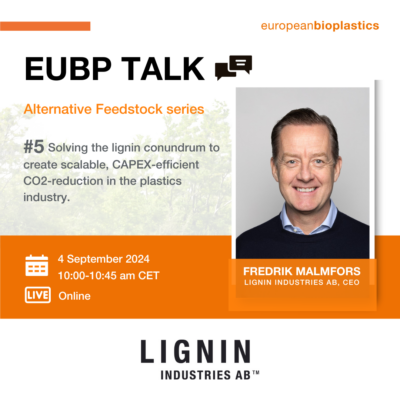- EUBP Talk #1 “From Linear to Circular: Waste Cooking Oils as Feedstock for Polymers and Plastics”
- EUBP Talk #2 “From organic waste to plastic monomers”
- EUBP Talk #3 “From brewery waste to bioplastics: results of the BioSupPack project on new value chains for innovative and sustainable packaging”
- EUBP Talk #4 “Transforming organic waste into bio-succinic acid on a pre-industrial scale”
- EUBP Talk #5: Solving the lignin conundrum to create scalable, CAPEX-efficient CO2-reduction in the plastics industry
- EUBP Talk: Series wrap-up. Alternative feedstock for biobased plastics: bridging the gap between research and market
EUBP Talk #1
The first talk of the series entitled “From Linear to Circular: Waste Cooking Oils as Feedstock for Polymers and Plastics” took place on 10 April 2024. Our guest speaker, Antonino Biundo Ph.D., from the University of Bari Aldo Moro, shared insights from the REWIND project on the topic of waste cooking oils as feedstock for the production of polymers and plastics through enzymatic modifications.
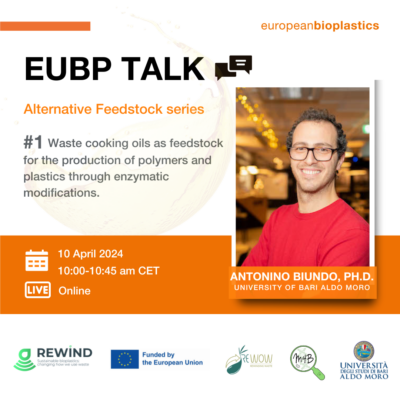
EUBP Talk #2
For our second EUBP Talk on 24 May entitled “From organic waste to plastic monomers”, Joachim Venus, from the Leibniz Institute of Agricultural Engineering and Bio-economy e.V. (ATB), will cover the results of two BBI-funded projects, CAFIPLA and PERCAL, which have investigated the use of organic waste to produce plastic monomers. Biowaste can be the source of feedstock for the bioeconomy.
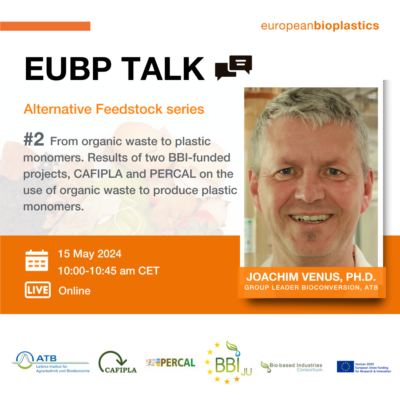
EUBP Talk #3
The third talk of the series “From brewery waste to bioplastics: results of the BioSupPack project on new value chains for innovative and sustainable packaging” will take place on 19 June 2024. Our guest speaker, Rosa González Leyba, from AIMPLAS, will talk about the innovation being done at the BBI-funded project, the valorisation of both by-products from the agri-food industry and different types of waste and their key role in the improvement of sustainability.
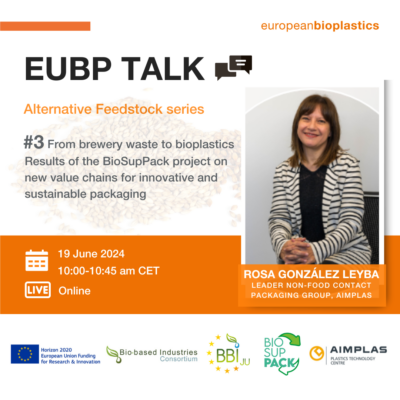
EUBP Talk #4
The fourth EUBP Talk will host Tanja Meyer from the Bio Base Europe Pilot Plant (BBEPP) who will cover the topic “Transforming organic waste into bio-succinic acid on a pre-industrial scale”. It will take place on 10 July 2024. Each year, millions of tonnes of bio-waste, particularly urban organic food waste, inundate European waste management systems. However, a substantial portion of this resource—approximately 60%—currently finds its way to incineration or landfills, resulting in substantial environmental and economic losses.
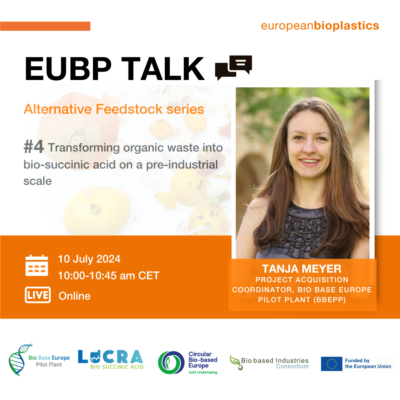
EUBP Talk #5
The fifth EUBP Talk will host Fredrik Malmfors from Lignin Industries, who will cover the topic “Solving the lignin conundrum to create scalable, CAPEX-efficient CO2-reduction in the plastics industry”. It will take place on 04 September 2024.
For decades, the forestry and pulp milling industries have been looking for ways to valorize Lignin. Typically being burnt for energy purposes in pulp mills, Lignin is abundantly available globally and could close the perceived “biomass” gap. Lignin Industries’ patented technology can now reduce 15-40% of fossil raw materials in PE, PP and ABS with more polymers to come. Being a true drop-in material as well as fully recyclable, it helps the plastic industry transition to climate-friendlier materials.
